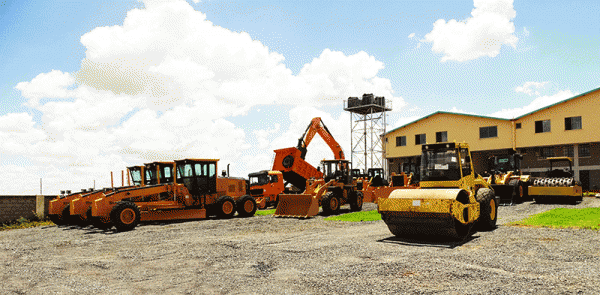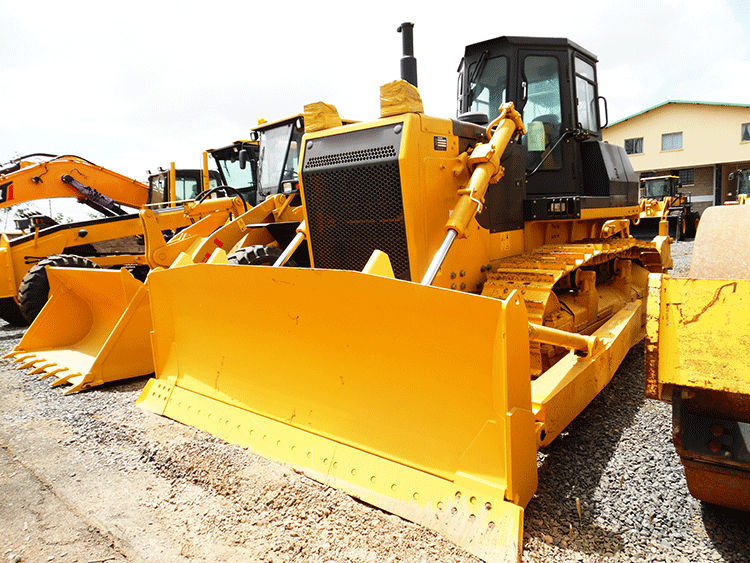Leading leasing firm in Kenya now banks on high demand for construction equipment to bloom.
With the current boom in the construction sector in Kenya, demand for construction equipment is skyrocketing.
But as demand surges, another challenge emerges; the financial muscle to buy equipment. Against this backdrop, most contractors have resorted to leasing which they say is an economical way of acquiring equipment at an affordable cost.
Small to medium construction companies which aren’t able to outright purchase the expensive equipment they need, can enjoy affordable and appropriate earth moving equipment from a reliable lessor.
Contrary to the days when the leasing business was embraced with skepticism, the venture is now gaining traction in Kenya as well as the region.
Leasing is considered important because it frees company’s cash flows by doing away with the need to spend more money by buying the required vehicle or equipment. Equipment lease doesn’t require a down payment; clients can obtain the assets they need without significantly affecting their cash flow.
If you’re looking for an upfront way to finance your construction equipment and machinery, where you can simply hand it back at the end of the contract period, and you have no desire to ever own the equipment, then Vehicle and Equipment Leasing Limited (VAELL) can be your choice of value. Since its incorporation in 2006, Vaell has curved out a niche for itself by offering tailor made services to its clients in Kenya and East Africa who include corporates and government institutions. Vaell, the leasing market leader in the region, acquired Club 101 company status in 2015 after winning the best in Transport award in the Top 100 KPMG/Business Daily Survey in 2014.
As a unique business practice, leasing has been accepted and embraced by leading multinational corporations around the globe as a sound model for asset acquisition. Equipment leasing is a convenient, cost-effective and hassle-free way of acquiring construction Equipment and there are many benefits of leasing equipment. It reduces the cost of construction as one does not need to purchase all equipment he needs.
 Key industry players cite the flexible terms of obtaining a lease as one of the major benefits that makes it attractive compared to loans. Leasing is the new business strategy for construction firms in a bid to meet the growing demand and managing their operational costs by passing on intermediate services of vehicle maintenance to lessors like VAELL which is their area of expertise. This helps construction companies to focus on their core mandate and hence become more productive. This is the same approach used by other key players is sectors such as telecommunication, manufacturing, logistics, health sector and governments in order to manage their cash-flows.
Key industry players cite the flexible terms of obtaining a lease as one of the major benefits that makes it attractive compared to loans. Leasing is the new business strategy for construction firms in a bid to meet the growing demand and managing their operational costs by passing on intermediate services of vehicle maintenance to lessors like VAELL which is their area of expertise. This helps construction companies to focus on their core mandate and hence become more productive. This is the same approach used by other key players is sectors such as telecommunication, manufacturing, logistics, health sector and governments in order to manage their cash-flows.
Leasing allows companies to use equipment for a specified period of time while making monthly or quarterly payments as the lessor takes care of maintenance, insurance and tracking. This helps them evade the unnecessary vast capital expenditure in buying the vehicles. With leasing,there is no need to worry about lifespan and obsolescence.
Through leasing contractors have the ability to use current technology since technology keeps upgrading. The tenant has the option of returning old machinery and obtaining a better version of the same equipment. The tenant therefore will remain competitive and productive for always employing latest technology.
It is worth noting that leasing is not buying. Leasing allows a client to use equipment for a specified period of time while paying a fixed reasonable monthly fee. This helps the client to avoid huge capital initial expenditure and the money saved can be used to finance other expenditure.
Despite the general lack of awareness about the benefits of leasing, the industry is now on the growth trajectory underscored by the rising number of firms specializing in leasing. The recent move by the government to adopt and embrace leasing has given the leasing industry the much needed impetus to expand.
Vaell offers different types of leasing depending on the need of the client. For instance, the firm has Finance Lease and Operating Lease.
The operating lease is further divided into two parts namely: Dry Operating Lease and Wet Operating Lease. A dry Lease is a basic lease granting full operational rights of the asset to the client while a wet lease covers additional costs like maintenance, fuel insurance, tracking and other fleet management services.
Understanding the different types of leases is key factor for a contractor or corporate organization when deciding whether to buy or lease equipment.
Vaell has a comprehensive network with fully-fledged subsidiaries in five countries; Kenya, Uganda, Tanzania, Rwanda and Zambia and plans are underway to venture into 30 African countries by 2018 to meet demands from both multinational and local clients venturing into new areas. Currently Vaell has been able to lease to over 20 countries in the region. Clients can lease from VAELL anywhere within the continent since VAELL has strategic partnerships with other major leasing firms in the continent.
Vaell enjoys a warm relationship with major auto motor dealers, financial institutions and banks to help it meet the unlimited market demand. Besides construction machinery, Vaell also leases other assets such as vehicles, IT equipment, office furniture, agricultural equipment and medical equipment. This has positioned Vaell a one stop shop where you can get any equipment you need at any given time.
“Our value added services such as training operators on how to use machinery for safety reasons and maintenance has over the years continued making us the leasing company of choice,” reveals Paul Njeru Vaell’s Regional Managing Director. Asked about the future of the leasing industry in Kenya, Njeru says, “We project that the industry will grow exponentially. Currently, construction activities are booming in Mombasa County where the need for leasing is on high demand.”
“To this end,” says Njeru, “we are coming up with innovative and tailor made products to serve our clients better even as we plan to spread our wings across the African continent.”

